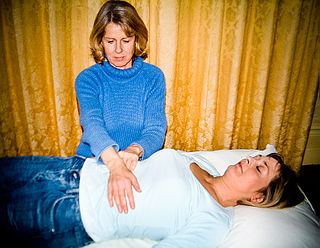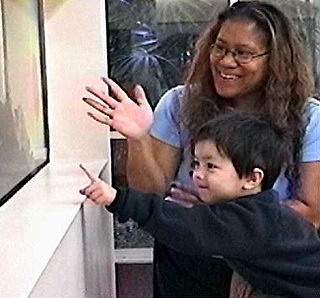
Dyslexia, previously known as word blindness, is a learning disability that affects either reading or writing. Different people are affected to different degrees. Problems may include difficulties in spelling words, reading quickly, writing words, "sounding out" words in the head, pronouncing words when reading aloud and understanding what one reads. Often these difficulties are first noticed at school. The difficulties are involuntary, and people with this disorder have a normal desire to learn. People with dyslexia have higher rates of attention deficit hyperactivity disorder (ADHD), developmental language disorders, and difficulties with numbers.

Reiki is a pseudoscientific form of energy healing, a type of alternative medicine originating in Japan. Reiki practitioners use a technique called palm healing or hands-on healing through which, according to practitioners, a "universal energy" is transferred through the palms of the practitioner to the client, to encourage emotional or physical healing. It is based on qi ("chi"), which practitioners say is a universal life force, although there is no empirical evidence that such a life force exists.

Quackery, often synonymous with health fraud, is the promotion of fraudulent or ignorant medical practices. A quack is a "fraudulent or ignorant pretender to medical skill" or "a person who pretends, professionally or publicly, to have skill, knowledge, qualification or credentials they do not possess; a charlatan or snake oil salesman". The term quack is a clipped form of the archaic term quacksalver, derived from Dutch: kwakzalver a "hawker of salve" or rather somebody who boasted about their salves, more commonly known as ointments. In the Middle Ages the term quack meant "shouting". The quacksalvers sold their wares at markets by shouting to gain attention.

Stephen Joel Barrett is an American retired psychiatrist, author, co-founder of the National Council Against Health Fraud (NCAHF), and the webmaster of Quackwatch. He runs a number of websites dealing with quackery and health fraud. He focuses on consumer protection, medical ethics, and scientific skepticism.

Quackwatch is a United States-based website, self-described as a "network of people" founded by Stephen Barrett, which aims to "combat health-related frauds, myths, fads, fallacies, and misconduct" and to focus on "quackery-related information that is difficult or impossible to get elsewhere". Since 1996 it has operated the alternative medicine watchdog website quackwatch.org, which advises the public on unproven or ineffective alternative medical remedies. The site contains articles and other information criticizing many forms of alternative medicine.
bibic is a small charitable organization based in the United Kingdom that supports children, young people and their families who have a wide range of different conditions. The charity was founded by the late Keith Pennock who had a daughter with a learning disability. The work was derived from Glenn Doman's The Institutes for The Achievement of Human Potential (IAHP) in Philadelphia, USA.
Orthomolecular psychiatry is the use of orthomolecular medicine for mental illness. Orthomolecular psychiatry has been rejected by evidence-based medicine and has been called quackery. The approach uses unorthodox forms of individualized testing and diagnosis to attempt to establish an etiology for each patient's specific symptoms, and claims to tailor the treatment accordingly, using a combination of nutrients, dietary changes and medications that are claimed to enhance quality of life and functionality as well as to reduce or eliminate symptoms and the use of xenobiotic drugs. Scientific studies have shown mixed results; although there are some promising results from nutritional psychiatry, some forms of orthomolecular psychiatry are ineffective.
Vision therapy (VT), or behavioral optometry, is an umbrella term for alternative medicine treatments using eye exercises, based around the pseudoscientific claim that vision problems are the true underlying cause of learning difficulties, particularly in children. Vision therapy has not been shown to be effective using scientific studies, except for helping with convergence insufficiency. Most claims—for example that the therapy can address neurological, educational, and spatial difficulties—lack supporting evidence. Neither the American Academy of Pediatrics nor the American Academy of Ophthalmology support the use of vision therapy.
The following outline is provided as an overview of and topical guide to autism:
The Institutes for The Achievement of Human Potential (IAHP), founded in 1955 by Glenn Doman and Carl Delacato, provide literature on and teaches a controversial patterning therapy, known as motor learning, which the Institutes promote as improving the "neurologic organization" of "brain injured" and mentally impaired children through a variety of programs, including diet and exercise. The Institutes also provides extensive early-learning programs for "well" children, including programs focused on reading, mathematics, language, and physical fitness. It is headquartered in Philadelphia, with offices and programs offered in several other countries.

Autism therapies include a wide variety of therapies that help people with autism, or their families. Such methods of therapy seek to aid autistic people in dealing with difficulties and increase their functional independence.

Energy medicine is a branch of alternative medicine based on a pseudo-scientific belief that healers can channel "healing energy" into a patient and effect positive results. The field is defined by shared beliefs and practices relating to mysticism and esotericism in the wider alternative medicine sphere rather than any sort of unified terminology, leading to terms such as energy healing or vibrational medicine being used as synonymous or alternative names. In most cases there is no empirically measurable energy involved: the term refers instead to so-called subtle energy. Practitioners may classify the practice as hands-on, hands-off, and distant where the patient and healer are in different locations. Many schools of energy healing exist using many names: for example, biofield energy healing, spiritual healing, contact healing, distant healing, therapeutic touch, Reiki or Qigong.
Health is the state of complete physical, mental, and social well-being and a positive concept emphasizing social and personal resources, as well as physical capacities. This article lists major topics related to personal health.

Equine-assisted therapy (EAT) encompasses a range of treatments that involve activities with horses and other equines to promote human physical and mental health. Modern use of horses for mental health treatment dates to the 1990s. Systematic review of studies of EAT as applied to physical health date only to about 2007, and a lack of common terminology and standardization has caused problems with meta-analysis. Due to a lack of high-quality studies assessing the efficacy of equine-assisted therapies for mental health treatment, concerns have been raised that these therapies should not replace or divert resources from other evidence-based mental health therapies. The existing body of evidence does not justify the promotion and use of equine-related treatments for mental disorders.
Alternative therapies for developmental and learning disabilities include a range of practices used in the treatment of dyslexia, ADHD, autism spectrum disorders, Down syndrome and other developmental and learning disabilities. Treatments include changes in diet, dietary supplements, biofeedback, chelation therapy, homeopathy, massage and yoga. These therapies generally rely on theories that have little scientific basis, lacking well-controlled, large, randomized trials to demonstrate safety and efficacy; small trials that have reported beneficial effects can be generally explained by the ordinary waxing and waning of the underlying conditions.
Aquatic therapy refers to treatments and exercises performed in water for relaxation, fitness, physical rehabilitation, and other therapeutic benefit. Typically a qualified aquatic therapist gives constant attendance to a person receiving treatment in a heated therapy pool. Aquatic therapy techniques include Ai Chi, Aqua Running, Bad Ragaz Ring Method, Burdenko Method, Halliwick, Watsu, and other aquatic bodywork forms. Therapeutic applications include neurological disorders, spine pain, musculoskeletal pain, postoperative orthopedic rehabilitation, pediatric disabilities, pressure ulcers, and disease conditions, such as osteoporosis.
Mental disorders diagnosed in childhood can be neurodevelopmental, emotional, or behavioral disorders. These disorders negatively impact the mental and social wellbeing of a child, and children with these disorders require support from their families and schools. Childhood mental disorders often persist into adulthood. These disorders are usually first diagnosed in infancy, childhood, or adolescence, as laid out in the DSM-5 and in the ICD-11.
Speech and language impairment are basic categories that might be drawn in issues of communication involve hearing, speech, language, and fluency.
Harold Levinson is an American psychiatrist and author, known for developing his cerebellar theory of treating dyslexia.








